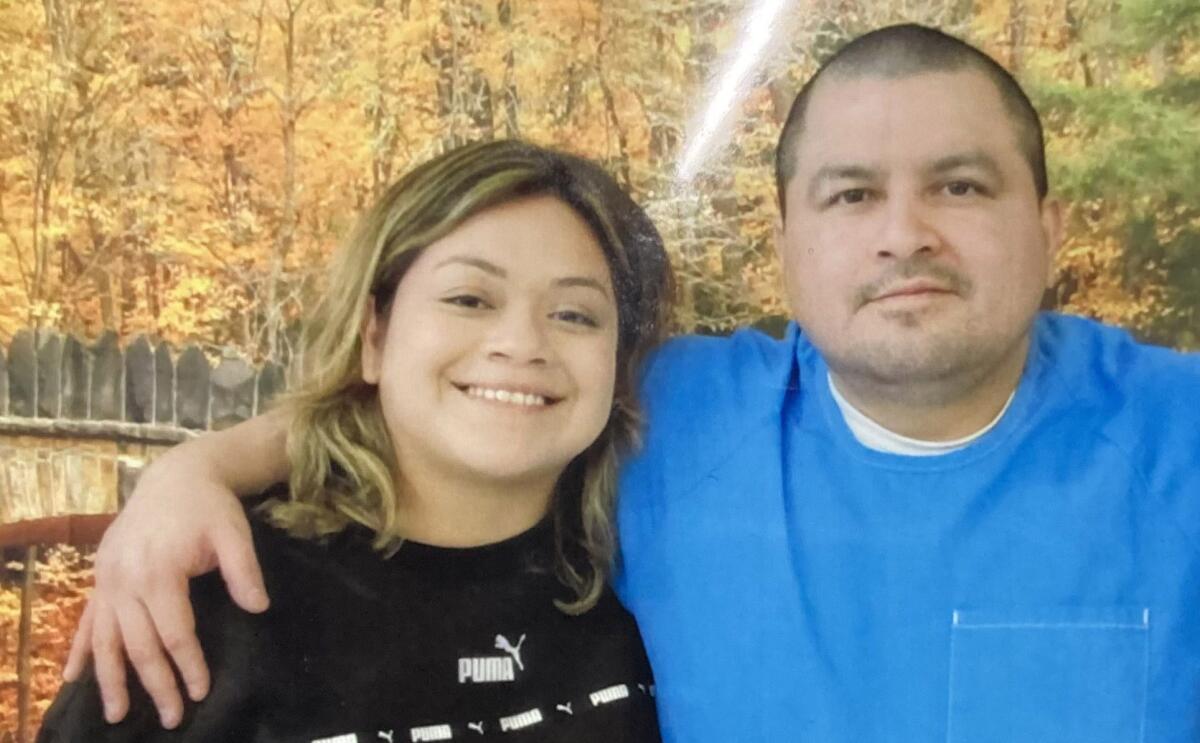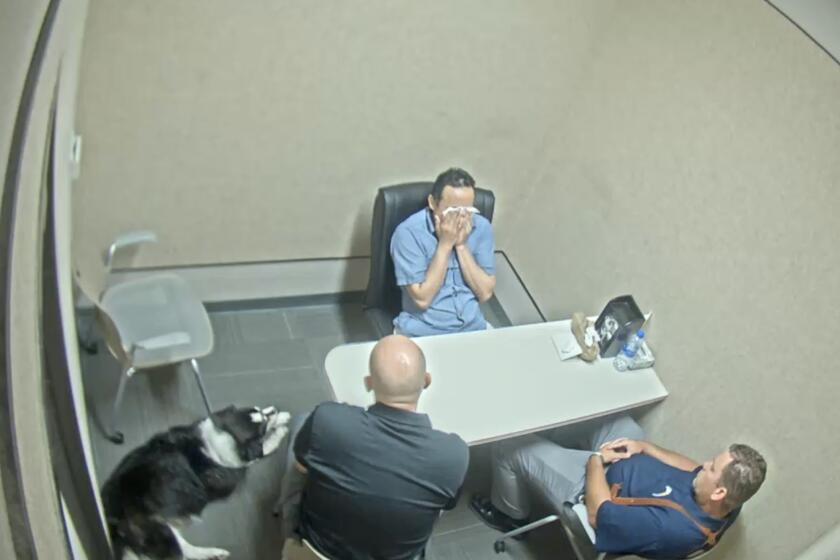At 15, he faced pressure to confess to murder. The L.A. County D.A. says he should be freed

- Share via
- Lombardo Palacios was 15 when he confessed to murder after a high-pressure police interrogation.
- L.A. County Dist. Atty. George Gascón now says that 2007 confession was false and made under duress.
- A judge is considering whether to declare Palacios factually innocent and set him free.
The teen slumped in a chair, sobbing, in a Los Angeles Police Department interrogation room.
“I wasn’t there,” he said, again and again, according to a video of the interrogation reviewed by The Times. “Please.”
“You were there,” one homicide detective responded, a point the detectives would make over and over. “Let’s get past that right now.”
The teenager kept crying and telling the detectives: This was wrong. He was innocent. Hours earlier, just before dawn, he had been awoken by officers who had stormed into the small Hollywood apartment he shared with his mother and sister. They had dragged him out of bed, brought him here and told him he had been identified as the shooter in a gang-related murder that had taken place on Sunset Boulevard a few months earlier. All that remained was for him to tell police what he had done.
At one point, officers left the room, and the teen pleaded with God to help the officers understand: He hadn’t killed anyone. But the officers would not accept that. They insisted the only way forward for him was to stop protesting his innocence and tell them how he had been involved.
“How old are you?” the detective asked.
“Fifteen,” he said, sobbing.
“You are a young man with a future,” the detective said.
But he wasn’t. Not after what happened in that interrogation room on May 30, 2007.
After hours of questioning, Lombardo Palacios, a refugee from Guatemala who had a passion for art and was fiercely protective of his younger sister, finally told officers what they had asked for — sort of. He said he had been at the scene, maybe in the morning, or maybe when “it was kind of late.” Maybe he had shot a revolver in the air, he said. Maybe he had pulled the trigger twice. Maybe the victims had been walking in a parking lot when they were shot.
These details didn’t match the crime, according to descriptions of the incident included in court filings. After the officers left the room, Palacios repeated: “I didn’t do nothing.”
But after his confession, Palacios’ fate appeared set.
Police would build a case against him and a young woman he said he did not know, Charlotte Pleytez, then 20 and pregnant, for the murder of Hector Flores, a former member of a rival gang. In 2009, they were convicted in L.A. County Superior Court and sentenced to 50 years to life in prison. (Flores’ fiancee, sitting in the passenger seat, was shot and wounded in the same attack and survived.)
But, according to new findings from the L.A. County district attorney, neither Palacios nor Pleytez had any involvement with the crime. Palacios’ confession, said Dist. Atty. George Gascón, was false. Gascón told The Times this week that he is “convinced that not only are they innocent, but we believe we might know who committed the murder.”
The district attorney’s office, in a motion filed jointly with attorneys for Palacios and Pleytez, has asked a judge to declare the two factually innocent. New suspects have been identified, according to a court motion.
Los Angeles County Superior Court Judge William C. Ryan reviewed the petition Tuesday, but there was a twist: Unexpectedly, the prosecutor who originally tried the case, Dayan Mathai, showed up to protest.
“I felt obliged to come before your honor and ask for an opportunity to file a declaration that sheds light on the credibility of some of the witnesses” who are supporting exoneration, Mathai said. He added that a victim also wanted to be heard.
Thomas Trainor, the prosecutor handling the case for the district attorney, said that after reviewing the court file, the district attorney’s file, the police file and trial transcripts, he was “very confident in the analysis” that led him to ask for the pair’s convictions to be set aside. Still, Trainor said, Mathai should be “given an opportunity to be heard.”
“I’m sorry to have to postpone this,” Ryan said. “I am.”
But he did, pushing the hearing to Nov. 1.
Though Palacios’ confession was ultimately not used at trial, the convictions can be traced, in part, back to his breakdown in the interrogation room, his lawyer said. In California and across the country, many detectives have been taught not to take no for an answer if they believe they have the right suspect. The detectives are trained to form a theory of how the crime occurred based on available facts, then to relentlessly question suspects — even claiming falsely to have eyewitness accounts, forensic evidence and other proof of guilt — until they elicit a confession.
Along with being a favored interview method for American detectives, this approach has become iconic in popular culture, the image of the hard-nose detective refusing to back down, eventually breaking a lying and guilty suspect through sheer force of will. However, more recent research on interrogation methods and human psychology has shown this tactic can prove flawed, especially when used on young or vulnerable people, and lead to false confessions.
A California law that went into effect in January now bars police from using this method on juveniles, prohibiting law enforcement “from employing threats, physical harm, deception, or psychologically manipulative interrogation tactics,” on subjects 17 or younger. The interrogation method still remains in wide use for adults, much to the chagrin of some who see it as outdated.
It is a method that is “inherently deceptive and harmful to the pursuit of justice,” said El Dorado County Dist. Atty. Vern Pierson, who advocated for the new law prohibiting the technique in juvenile interrogations.
“There’s a better, more effective and ethical way for law enforcement to conduct interviews,” Pierson said.
The LAPD did not provide comment about the case.
Nearly two decades after a woman falsely confessed to a shocking murder, her sons finally see her exonerated from a wrongful conviction that derailed their lives.
Palacios and Pleytez came on the radar of police shortly after Flores was killed, as detectives heard word that the killers were believed to be associated with the White Fence gang, according to the habeas petition. Police located three people who said they had witnessed the shooting, according to the petition: Flores’ fiancee, along with two young women who had been in the parking lot getting ready to go to a nearby nightclub.
Police showed the women a book full of photographs of White Fence gang members. Flores’ girlfriend, who wore glasses with trifocal lenses, picked out Palacios. The other two women also picked out Palacios, although they later testified in court that they were not certain. One woman said: “The skin tone stood out and his nose,” according to the petition.
The witnesses also identified Pleytez from the gang book. She was one of only two women included in it, according to the petition.
There was no physical evidence introduced at trial linking either of them to the shooting, according to prosecutors. They were convicted based on the witness testimony, and went to prison in 2009.
For years, their appeals went nowhere. Then, in 2021, a law student at Loyola Law School in Los Angeles heard about the case from a friend who knew Pleytez. The student, Nicolas Tomas, read a letter Palacios had sent to the Innocence Project, begging for help.
“I am an innocent person,” Palacios wrote. “I was really young and had no clue of how to defend myself legally.”
Tomas began investigating and became convinced that the pair had been wrongly convicted. Though he was still in law school, he was determined to do something.
At first, Palacios’ family was skeptical. They had gotten their hopes up before, only to have them dashed. But eventually, said Palacios’ sister, Sigry Ortiz, Tomas won them over.
“He never gave up on my brother or Charlotte, you know, like he never turned his back and never abandoned my brother’s case.”
He also employed some creative tactics to get authorities’ attention, including driving to San Diego to crash a gala dinner full of lawyers who work on innocence cases. He took Ortiz, who is now 26 and in medical school, with him.
Once there, they managed to find a woman who was then the head of the Conviction Integrity Unit at the L.A. County district attorney’s office. They approached her as she was trying to enjoy a glass of wine, and managed to win an appointment to make their case.
Tomas also worked to free Pleytez. But she had help from another avenue as well.
Like the Palacios family, the Pleytez family are immigrants. They came from El Salvador, and Pleytez’s mother, Carla Campos, works as a cleaning lady. Pleytez, the fifth of seven children, often helped her.
Pleytez was about two months pregnant when she was taken into custody. She gave birth incarcerated, handcuffed to a gurney. The baby girl was taken away from her after one day, and Campos raised her.
Unlike Palacios, though, Pleytez never confessed, maintaining her innocence throughout her interrogation, trial and incarceration. Pleytez tried to make the best of her circumstances at the Central California Women’s Facility in Chowchilla. She learned sign language and took part in a program that taught her to train service dogs for the blind. If she is released, she hopes to find work with animals.
On the outside, her family searched for ways to prove her innocence.
“I never stopped fighting, I never gave up,” Campos said. “I would tell her story to those who would listen to me.”
Thomas Perez Jr. contacted police after his elderly father went missing. Soon after, he would be falsely accused of murder and locked in a psych ward, because police tricked him into believing he was a killer.
Eventually, Campos found a private investigator, John Brown, who began his career helping farmworkers in the Central Valley in their fight to unionize and now specializes in investigations for those accused of crimes.
“John is an angel that was placed in our path,” Campos said.
Brown set to work reinvestigating the original crime. He said he is not at liberty to talk about his findings. But the petition filed with the court, though heavily redacted, makes clear that Gascón and the defense attorneys have identified other suspects as the likely perpetrators. Pleytez may have met one of them during her time behind bars.
Brown said that he has no doubts Pleytez and Palacios are innocent, but what strikes him most about the case is the “class disparity.” Had Playtez and Palacios not been poor immigrants, “this never would have proceeded as far as it did,” he said.
“The absolute powerlessness of the defendants and their families created the perfect storm of where there were no guardrails,” he said. “Nobody heard them. Nobody listened.”
Tuesday afternoon, Sigry Ortiz and her mother stood outside the gates of the California Medical Facility in Vacaville, where Palacios is being held. The minutes turned to hours as the courtroom drama 400 miles south unfolded. Then, the hard news came: There would be no exoneration this day and no release.
Palacios had been present at the proceedings via video, and now he called his lawyer, who put him on speakerphone as they all fought to make sense of it.
“Keep your head up,” Ortiz told him, then in Spanish, “Stay calm.”
His mother looked crushed, not speaking a word.
“I got to wait,” Palacios said. “I have no choice.”
Times staff writer Matthew Ormseth contributed to this report.
More to Read
Sign up for Essential California
The most important California stories and recommendations in your inbox every morning.
You may occasionally receive promotional content from the Los Angeles Times.














